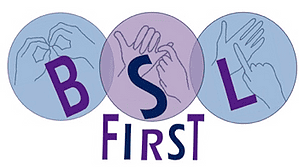Pre-Level 6 BSL (Online)
Choose from self-guided online study or live taught classes with a teacher and achieve a professional qualification.
Upcoming courses
Upcoming courses
Pre-Level 6 BSL - Course content
The Pre-Level 6 course is not accredited and you will not receive a formal qualification. The aim of this course is to prepare you for the Level 6 Certificate in British Sign Language qualification. You will develop your linguistic skills in British Sign Language towards upper-intermediate level, or B2 of the CEFR. Teaching begins by briefly re-visiting the vocabulary and grammatical structures covered in Level 3, before moving swiftly onto developing skills, understanding and knowledge in BSL grammar, receptive skills, productive skills and conversational skills.
The course is delivered in an informal and relaxed environment and your teacher will use a variety of teaching and learning methods to cater for all learning styles and to meet the needs of all learners. The course is designed to be fun, engaging and meaningful and will give you the opportunity to practice your productive and receptive skills by means of group work, pair work, role-plays, games, presentations and discussions.
The Pre-Level 6 course is useful for anybody who is in regular contact with deaf people, be it through work or social life. On completion of this course, learners will be able to further develop their linguistic skills by progressing onto the Level 6 Certificate in British Sign Language course and/or onto professional training in interpreting, translation and communication support.
| Theme | Topics covered |
|---|---|
| Employment and business |
|
| Education |
|
| Health and wellbeing |
|
| Society and politics |
|
| Science and technology |
|
| Media and culture |
|
Assessments
There are total of 3 assessments for this qualification:
| No. | Topic | Assessment |
|---|---|---|
| 1 | Productive skills | Formal presentation (10-12 minutes) |
| 2 | Conversational skills | Informal conversation (12-14 minutes) |
| 3 | Receptive skills | Receptive skills written exam |
Entry Requirements
- Level 3 qualification in BSL (or have Level 3 equivalent BSL skills)
- Pass the interview
You must also have a good level of literacy to be able to read and understand the course materials.
This is an advanced level course. There is only so much you can learn in a classroom, so you are expected to already be working or socialising with native signers on a regular basis.
All applicants must attend a short interview online before being offered a place. The interview costs £50 for non-BSL First students and is free for continuing BSL First students.
Progression
When you have completed this course, you will be able to continue to develop your linguistic skills by progressing on to the Level 6 Certificate in British Sign Language course.
Careers
Learning BSL isn’t just fun, for many it’s the starting point of a new and exciting career, or professional development in their current role. Popular careers include BSL/English Interpreter, BSL/English Translator, Communication Support Worker, Teacher of the Deaf and BSL Teacher. Our courses are designed to respond to industry demand, which means they won’t just prepare you for the assessment, but also they will equip you with the skills to succeed in your chosen career, or any other career involving the use of BSL.
Our teachers have a wealth of knowledge and experience in British Sign Language, teaching, interpreting, translation and communication support, so no matter what your goals are we will help to achieve them.
Here are some popular careers that require knowledge and skills in BSL.
- BSL/English Interpreter
- International Sign Interpreter
- BSL/English Translator
- Communication Support Worker
- Teacher of the Deaf
- BSL Teaching Assistant
- Educational Communication Support Worker
- BSL Support Worker
- Communicator Guide
- BSL Teacher
- Notetaker
- Lipspeaker
- Deafblind Interpreter
Fees
For more information about how our course fees are calculated, please see our Help Section.
For individuals paying privately
Option 1 – Pay in full
Option 2 – Pay in instalments
For employers and organisations
We do not absorb the VAT for VAT-registered companies. We will raise an invoice for the full course and exam fee. We do not offer employers the option to pay in instalments.
There is no VAT on the exam fee.
PO number and employer financial details required at the time of application.
Refund policy:
£768 refundable up to 21 days after the course starts. No refund after 21 days.
